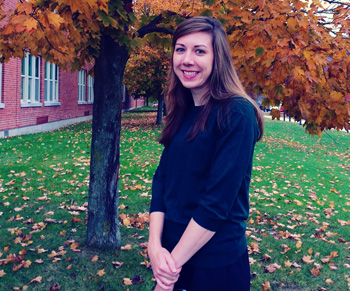
Christa Calkins
When Christa Calkins travels to Poland on USC Shoah Foundation and Discovery Education’s Auschwitz: The Past is Present professional development program this January, her students back home will be right there with her –at least virtually.
Calkins teaches English and public speaking at Campbell-Savona Jr./Sr. High School in Campbell, NY. Calkins and 24 other teachers from the United States and around the world were chosen to travel to Poland and attend the commemoration of the 70th anniversary of the liberation of Auschwitz on Jan. 27, 2015. While in Poland, they will learn about teaching with testimony and lessons of the Holocaust that they can share with their students.
Calkins said she’s been interested in the Holocaust since she read Lois Lowry’s Number the Stars in sixth grade. She also read Anne Frank: The Diary of a Young Girl and other books about Holocaust survivors and victims. As a teacher, she helped design a 10th grade unit on fighting oppression that included Elie Wiesel’s Night and other stories. Calkins has also had Holocaust survivors visit her school to speak with students.
Calkins is already planning lessons that will engage her students while she’s in Poland, through her blog and other distance learning methods. She will also create new resources for current and former students “that help them further investigate the Holocaust, the historical context of Poland specifically, as well as to apply their learning to the challenges our global society faces today,” she said.
The Past is Present program will instruct the teachers in how to teach with testimony from the Visual History Archive. While Calkins has been able to invite several Holocaust survivors to speak to her class, those opportunities are becoming more limited, so testimony will be all the more important, she said. Listening to a Holocaust survivor tell his or her story is a powerful and emotional experience.
“My students who’ve been able to listen to a survivor’s story have a deeper understanding of history and global issues because they now have a personal connection to a survivor,” Calkins said.
Calkins has taught her students that they must study the Holocaust so that an atrocity like it never happens again.
“I want to take that teaching and learning further to help my students take action to improve conditions both locally and globally to aid in stopping current atrocities and prevent future ones from occurring,” she said.